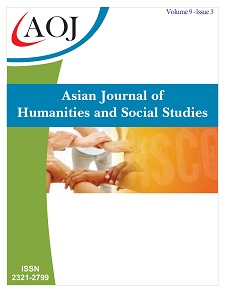Serial Recall among Adolescents in Abakaliki: Examining the Roles of Reproductive Maturity and Age
DOI:
https://doi.org/10.24203/ajhss.v9i3.6412Keywords:
Reproductive maturity, Age, Serial recall, Female, AdolescenceAbstract
The study investigated the roles of reproductive maturity and age on serial recall. Eighty (80) senior secondary school students from a public community secondary school in Abakaliki participated in the study. Participants comprised younger and older adolescents within the ages of 11 – 13 years with a mean of 12.25 years, and 14 – 17 years with a mean age of 15.73 years, respectively. The design of the study is quasi-experimental; the participants responded under 4 independent conditions: younger participants with reproductive maturity and younger participants without reproductive maturity; older participants with reproductive maturity and older participants without reproductive maturity. Data analysis using 2 X 2 ANOVA (F-test) revealed significant influence of reproductive maturity; non-significant influence of age, and significant interaction of reproductive maturity and age on serial recall. The results were discussed in terms of their relevance in education and eye-witness testimony.
References
Rehnman, J., & Herlitz, A. (2007). Women remember more faces than men do. Acta Psychologica, 124(3), 344–355.
Lindholm, T., & Christianson, S. Å. (1998). Gender effects in eyewitness accounts of a violent crime. Psychology. Crime & Law, 4(4), 323–339.
Rhodes, S., Greene, N. R., & Naveh-Benjamin, M. (2019). Age Related Differences in Recall and Recognition: A Meta-Analysis. Retrieved on 16th April, 2019 from https://osf.io/5gx86/.
Zelinski, E. M., Gilewski, M. J., & Schaie, K. W. (1993). Individual differences in crosssectional and three-year longitudinal memory performance across the adult life span. Psychology and Aging, 8(2), 176–186.
Herlitz, A., Nilsson, L.-G., & Bäckman, L. (1997). Gender differences in episodic memory. Memory and Cognition, 25(6), 801–811.
Herlitz, A., & Rehnman, J. (2008). Sex differences in episodic memory. Current Directions in Psychological Science, 17(1), 52–56.
Tulving, E. (1993). Human memory. In P. Andersen, O. Hvalby, O. Paulsen, & B. Hökfelt (Eds.), Memory concepts – 1993: Basic and clinical aspects (pp. 27-45). Amsterdam: Elsevier.
Downloads
Published
Issue
Section
License
Copyright (c) 2021 Chiedozie Okechukwu Okafor, Emmanuella U. Anozie, Sorochi Berny Anyanwu

This work is licensed under a Creative Commons Attribution-NonCommercial 4.0 International License.
- Papers must be submitted on the understanding that they have not been published elsewhere (except in the form of an abstract or as part of a published lecture, review, or thesis) and are not currently under consideration by another journal published by any other publisher.
- It is also the authors responsibility to ensure that the articles emanating from a particular source are submitted with the necessary approval.
- The authors warrant that the paper is original and that he/she is the author of the paper, except for material that is clearly identified as to its original source, with permission notices from the copyright owners where required.
- The authors ensure that all the references carefully and they are accurate in the text as well as in the list of references (and vice versa).
- Authors retain copyright and grant the journal right of first publication with the work simultaneously licensed under a Attribution-NonCommercial 4.0 International that allows others to share the work with an acknowledgement of the work's authorship and initial publication in this journal.
- Authors are able to enter into separate, additional contractual arrangements for the non-exclusive distribution of the journal's published version of the work (e.g., post it to an institutional repository or publish it in a book), with an acknowledgement of its initial publication in this journal.
- Authors are permitted and encouraged to post their work online (e.g., in institutional repositories or on their website) prior to and during the submission process, as it can lead to productive exchanges, as well as earlier and greater citation of published work (See The Effect of Open Access).
- The journal/publisher is not responsible for subsequent uses of the work. It is the author's responsibility to bring an infringement action if so desired by the author.


